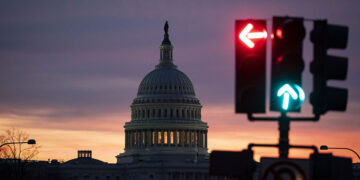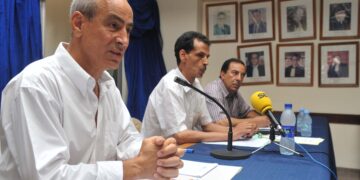President Biden Should Meet with Pennsylvania-Based Family and Call for the Release of its Detained Members
(Washington, DC, and London, UK, July 26, 2023): Saudi authorities have detained five family members of 15-year-old U.S. citizen Rakan Nader Aldossari and are prosecuting them in the country's terrorism court, said the Freedom Initiative, Democracy for the Arab World Now (DAWN), and ALQST for Human Rights. Their prosecution appears to be entirely in retaliation to Aldossari's commercial lawsuit against the Saudi government.
"Nearly five years since Saudi Arabia's murder of Jamal Khashoggi, its government continues to attack U.S. citizens, this time, by prosecuting family members in Saudi Arabia in retaliation for a commercial lawsuit brought against the Saudi government in Pennsylvania," said Sarah Leah Whitson, DAWN's Executive Director. "The very least the Biden administration can do is protect U.S. citizens and their family members from such gross acts of extraterritorial repression."
According to the Aldossari family, Saudi security forces detained four of the five Aldossari family members on May 11, 2023, including Rakan Aldossari's two uncles, Dr. Salman Turki Aldossari and Sultan Turki Aldossari; one aunt; and his grandfather's wife, Muneerah Mohammed al-Qahtani, a Kuwaiti citizen in Riyadh's al-Malaz prison. Earlier, on April 9, security forces had detained another one of Aldossari's uncles, Nayef Turki Aldossari. According to family members, they are detained in poor conditions, some in cold cells with no blankets or proper beds.
On July 12, 2023, the Aldossari family learned that the Saudi prosecutor's office referred the case of the five detained family members to the country's Specialized Criminal Court (SCC), the family told the three organizations. In recent years, the SCC has doled out extraordinarily harsh sentences to human rights defenders and dissidents amid a renewed crackdown on dissent. According to the Aldossari family, Saudi authorities have prevented the family's lawyers from meeting with the detainees, while the public prosecutor has refused to respond to the lawyers' requests for information or to give them copies of any case-related documents. The family and lawyers do not yet know the charges against the five.
Nader Aldossari, Rakan's father, confirmed to the organizations that interrogators have made it clear to detained family members that they will not be released unless both Rakan and he return to Saudi Arabia, where they face arrest and prosecution in retaliation to their lawsuit, although they are not aware of any charges against them. They left Saudi Arabia in June 2021.
As detailed below, the Aldossari family has had a long-standing commercial dispute with Saudi authorities. It filed a lawsuit against former Saudi Crown Prince Mohammed bin Nayef (commonly referred to as "MBN") and others in the federal district Court for the Eastern District of Pennsylvania on June 29, 2020. The lawsuit alleges breach of contract by MBN and two other parties to an agreement between four partners in 1994. The family amended its lawsuit on October 2, 2020, to name additional Saudi government defendants, including the newly appointed Crown Prince Mohamed bin Salman (commonly referred to as "MBS"), since the Saudi government confiscated MBN's assets and put him under house arrest. It is believed that this is when Mr. Aldossari and his family's problems began. A federal appellate court affirmed the district court's dismissal of the suit for lack of jurisdiction, but the punishment of the Aldossari family continues.
"In a gross abuse of authority, the Saudi regime is turning a private, commercial dispute into a basis for unjust detention," said Andrea Prasow, Executive Director for the Freedom Initiative. "It strains imagination to come up with a better example of Saudi Arabia's farcical judiciary than to see its government prosecute a 55-year-old grandmother on terrorism charges because her grandson filed a commercial lawsuit in the U.S."
Despite numerous outreach efforts, the Biden administration has not met with the Aldossaris or provided any indication it is willing to intervene on the family's behalf. Nader Aldossari, Rakan's father, previously sent letters to President Biden, the National Security Council, and Secretary Blinken on February 10, 2021, requesting their intervention after the Saudi authorities briefly detained both him and Rakan at the Riyadh airport on their way to Washington, D.C. The Saudi authorities released them an hour later and told them they were banned from traveling by orders from the Saudi Royal Court.
"The Biden administration should meet with Rakan Aldossari and his family and ensure they are protected from further Saudi government persecution," said Julia Legner, Executive Director of ALQST for Human Rights. "The State Department would do well to investigate the Saudi officials involved in this effort to retaliate against the family members of an American citizen and impose Khashoggi Ban sanctions on them."
On June 9, 2021, Rakan Aldossari recorded and sent an urgent video message through the U.S. Embassy in Riyadh asking President Biden to intervene and protect them from retaliation by Saudi officials. The Embassy replied that they would share the message with the U.S. State Department. Despite this, no response came from U.S. government agencies, but Mr. Aldossari and Rakan managed to leave Saudi Arabia in June 2021, after contacts informed them of the Saudi government's plan to target them in retaliation for the lawsuit.
The three organizations call on the Biden administration to demand the release of the Aldossari family members and end their persecution. The Biden administration should also impose the Khashoggi Ban – a policy that allows the State Department to impose visa restrictions on individuals who, acting on behalf of a foreign government, are directly engaged in serious, extraterritorial counter-dissident activities – on all Saudi officials, including judges and prosecutors, who have been participating in the extraterritorial harassment of Mr. Aldossari's family. The organizations also call on the Saudi government to release the Aldossari family members and end the sham prosecution against them.
Background: Commercial Dispute
The commercial dispute between the Aldossari family and the Saudi government dates back to December 1994, when four companies executed an agreement in Riyadh to establish an oil refinery in Saint Lucia, a Caribbean Island. These companies were Trans Gulf, a Saudi-based company represented by Turki bin Faraj bin Nader (bin Nader), Rakan Aldossari's grandfather; Saudi Est. for Development of Riyadh ("Saudi Est."), which according to Nader Aldossari was represented by former Saudi Crown Prince MBN; Export Refinery Western Hemisphere, Ltd. ("Export"), a British Virgin Islands corporation; and Transcontinental Oil and Financial Group of America, Inc. ("Transcontinental"), a Delaware corporation. According to Nader Aldossari, Export and Transcontinental were represented by Joseph Ripp, a Pennsylvania citizen. Trans Gulf was to receive 24% ownership of the refinery and serve as the Saudi and Middle East Manager of the project, according to a 1994 memorandum of understanding, as mentioned in the court documents.
According to Nader Aldossari, the other parties to the agreement acted in concert to breach the agreement and cut his father out of the deal. He claims that MBN wrote to his father in April 1995, promising him a 24% share of any future deal in Saint Lucia in return for bin Nader's giving up his share in the original project. According to Nader Aldossari, his father never received his share under the original or subsequent deals. Bin Nader died in 1999, and the matter was forgotten for 15 years. In 2014, Nader Aldossari claims he met with MBN in London, who according to him acknowledged the original agreement and bin Nader's right to receive an ownership share. According to Nader Aldossari, MBN promised to arrange a payment in the following weeks and assigned his private advisor General Saleh Aljiloud to follow up with Nader Aldossari. But in 2017, Saudi authorities placed MBN under house arrest and seized his assets.
In June 2020, Aldossari filed suit on behalf of his son, Rakan Aldossari, to whom he transferred the right to recover on any of his claims through an "Assignment of Claim." The suit alleged breach of contract by Ripp, the Kingdom of Saudi Arabia, Saudi Aramco, and MBN, and added that other Saudi officials intentionally interfered with contractual relations by undermining MBN's effort to fulfill obligations to bin Nader and his descendants. In May 2021, the district court judge for the Eastern District of Pennsylvania dismissed Aldossari's claims and ruled that the court lacked subject-matter jurisdiction over the case. It concluded that Aldossari and Rakan lacked standing to pursue any claims. The Court also held that all defendants with the exception of Ripp were immune from the suit because of the Foreign Sovereign Immunities Act of 1976 (the "FSIA"), 15 U.S.C. § 1602 et seq., and because of the common law of conduct-based immunity for officials of a foreign government. The Court ordered dismissal without prejudice, but when Aldossari chose to stand on his complaint, it converted its order to a dismissal with prejudice. Aldossari then appealed the Court's decision.
On September 13, 2022, the United States Court of Appeals, Third Circuit, published its verdict on Aldossari's appeal. It agreed with the District Court on its lack of subject matter jurisdiction over the case. And while the Court of Appeals disagreed with the District Court on certain technicalities, it found its dismissal of the case justified but changed it from dismissal with prejudice to dismissal without prejudice.




































